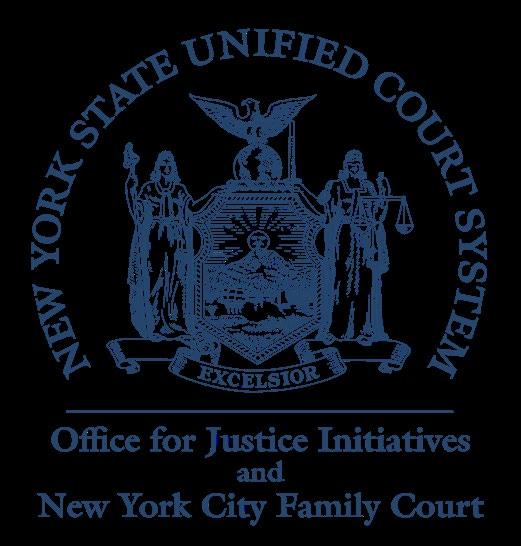



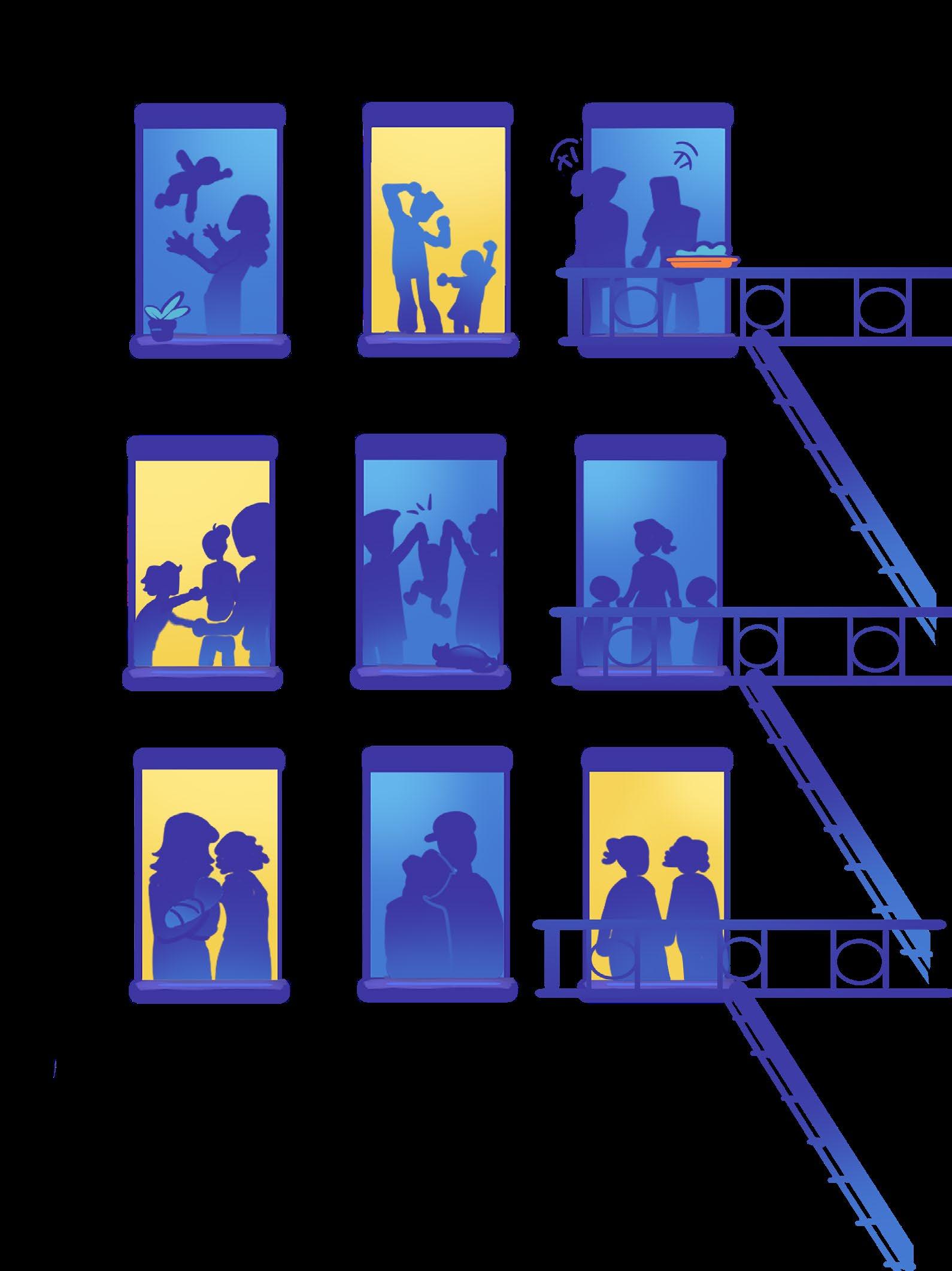

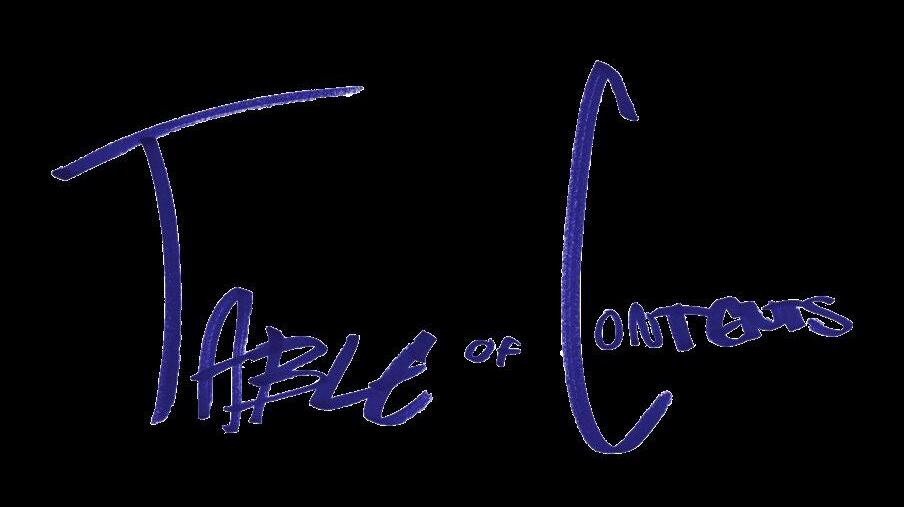








Welcome to the New York City Family Court! We were established to address issues that deeply impact the lives of children, parents, and families. We have a wide range of services to fit the particular needs of the families we serve.
The Family Court Act gives us the authority to hear child custody, child support, child neglect, abuse, paternity, delinquency and other family related matters. As each case is filed, it is assigned its own identifying number, called a docket number. The docket number begins with a letter which indicates the type of case filed. For example, a paternity case is given a docket number beginning with the letter “P.”
Here in New York City, there is a family court in each of the five
counties. Generally, a case may be filed in the county where one of the family members lives. Filing in Family Court is free.
Some Family Court hearings and trials are heard by judges. Others such as custody, visitation, guardianship and family offenses may be heard by Court Attorney Referees. Child Support, parentage and paternity cases are heard before Support Magistrates. There are no juries in Family Court.
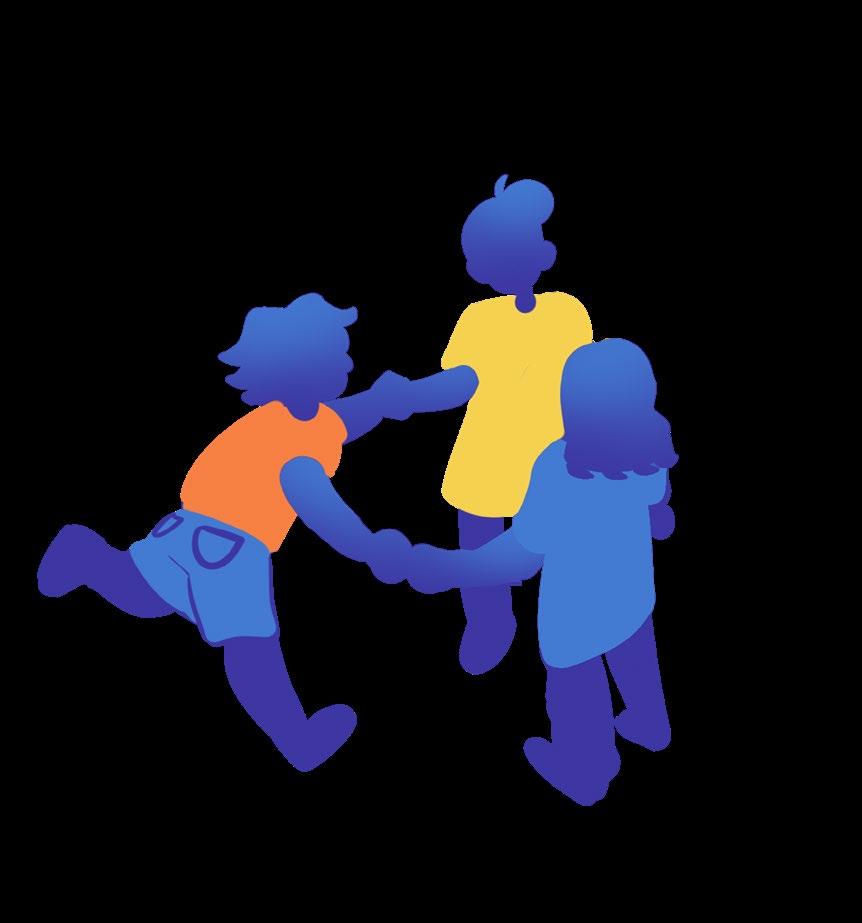

No matter what type of jurist (of those listed above) hears your case, you will be given an opportunity to be heard. Your voice is important to us.
The legal proceedings in Family Court are open to the public; however, the jurist hearing each case can determine who is permitted to observe the proceedings. Child Support, parentage and paternity cases are heard before Support Magistrates.
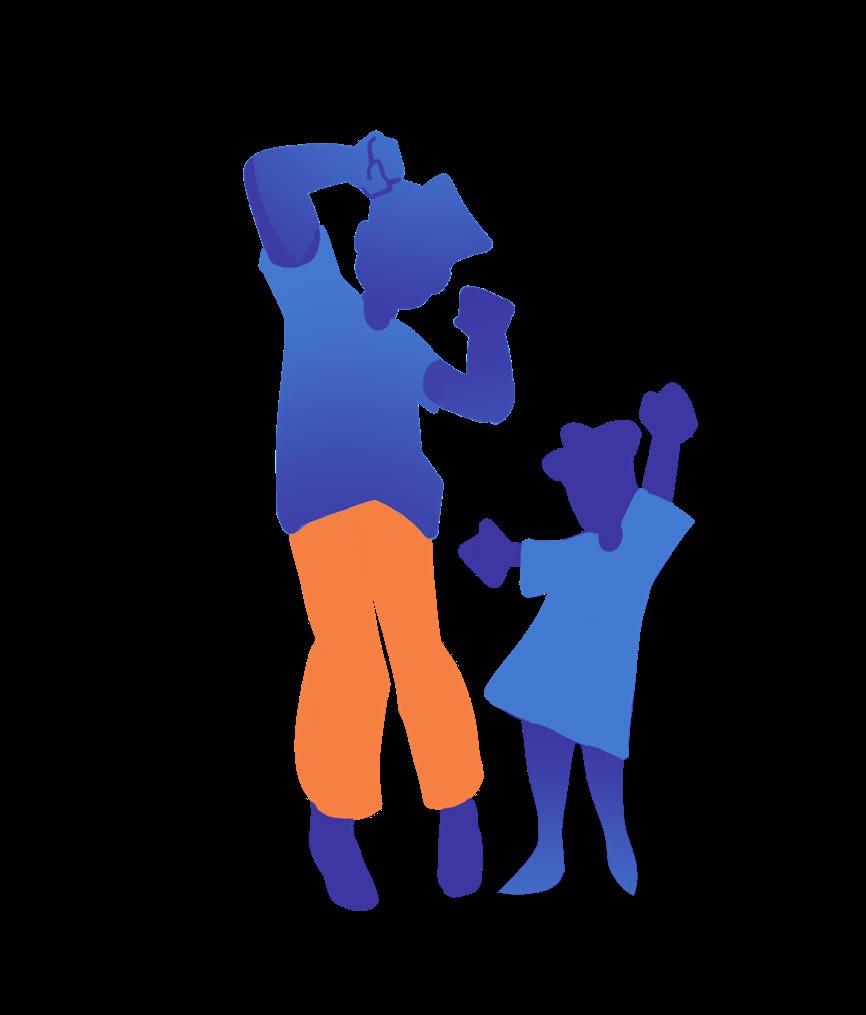
This guidebook was created to provide individuals, families, and communities with a better understanding of the New York City Family Court. Every year, thousands of children and families across the five counties are involved in matters that include custody, parenting time, child support, juvenile justice, orders of protection, adoption, guardianship and more.
Whether you are going through a difficult time or simply seeking information about Family Court or filing a petition, we want you to feel informed and supported. Within this guide, you will find information to help you understand how our court works and what you can expect when you enter our courthouses. You will also find an overview of the types of cases that we handle, how the court is structured, and the roles of the people who work within the court, including judges, referees, support magistrates, clerks, attorneys, court officers, interpreters, court reporters, and others—all committed to ensuring fairness, due process, respect, and compassion.
This guide also introduces various career paths and opportunities within the Family Court system for those who are interested in making a difference in their community.
Thank you for using this guidebook as a resource. We hope this information brings you greater clarity and confidence as you move forward. The Family Court exists to serve and support the people in our communities. We remain committed to treating every individual who walks through our doors with respect and fairness. No matter where you are in your journey, we are here to support you.
Sincerely,
Anne-Marie Jolly
Hon. Anne-Marie Jolly Administrative Judge New York City Family Court




Our mission Our Mission
Is to protect the rights of families and children by ensuring the just and timely resolution of all matters brought before the court while remaining committed to ensuring that all who serve in our court and all who enter our court are treated with respect and dignity.
The New York City Family Court is a due-process and data driven court, where there is respect for each and every individual appearing in and served by our court. It is our expectation that all cases will be addressed fairly and expeditiously.
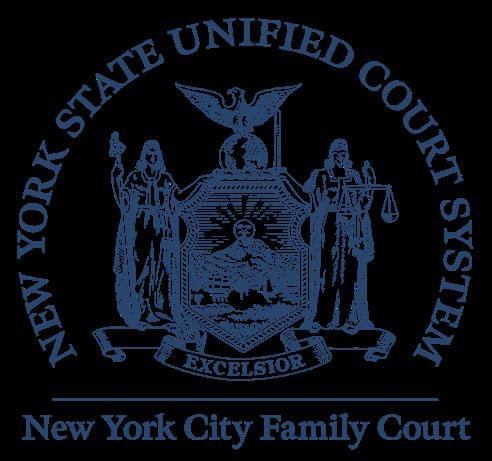
These are our tenets that we promise to every person who enters the building:
• Respect for all individuals with whom we interact
• Pride in our work
• Commitment to quality service
• Willingness to help others
• Fairness in our interactions with others
• Collaboration with our colleagues
• Integrity in our dealings with others
• Timely disposition of all cases
• Efficiency in all Family Court operations
Refers to the ability of all parties to meaningfully participate in court proceedings, receive fair treatment and obtain appropriate remedies such as court interpreters and assisted listening devices.
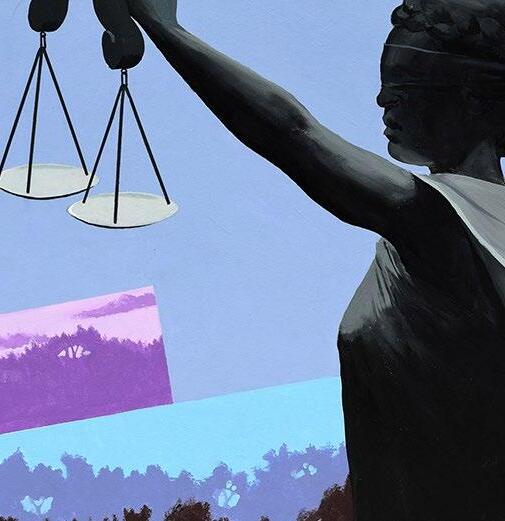

The New York City Family Court is committed to treating people fairly, equally, and with respect and compassion.
The New York City Family Court strives to ensure that every family that enters our Court receives the assistance needed to address their various legal issues. Once a case has been scheduled, parties are expected to arrive at the courthouse on time. If a party is not present when the case is called into the courtroom, the jurist may proceed and decide the case in that person’s absence or may dismiss it.
Each Family Court building has a Children Center meant to provide a safe space for children during court proceedings. The Children’s Centers provide free dropin childcare for parents and guardians attending scheduled court appearances.
After an order is issued, each party has the right to appeal the jurist’s decision, asking a higher court to review the evidence and any testimony presented at the Family Court hearing. The decisions made by support magistrates are appealed first by filing an objection to the decision; a Family Court judge reviews the support of the magistrate’s decision and order. An appeal may result in the court order being left as it is, somewhat changed, or vacated (undo the order). The Family Court records are not open to public inspection; however, the court may grant access to records when appropriate.
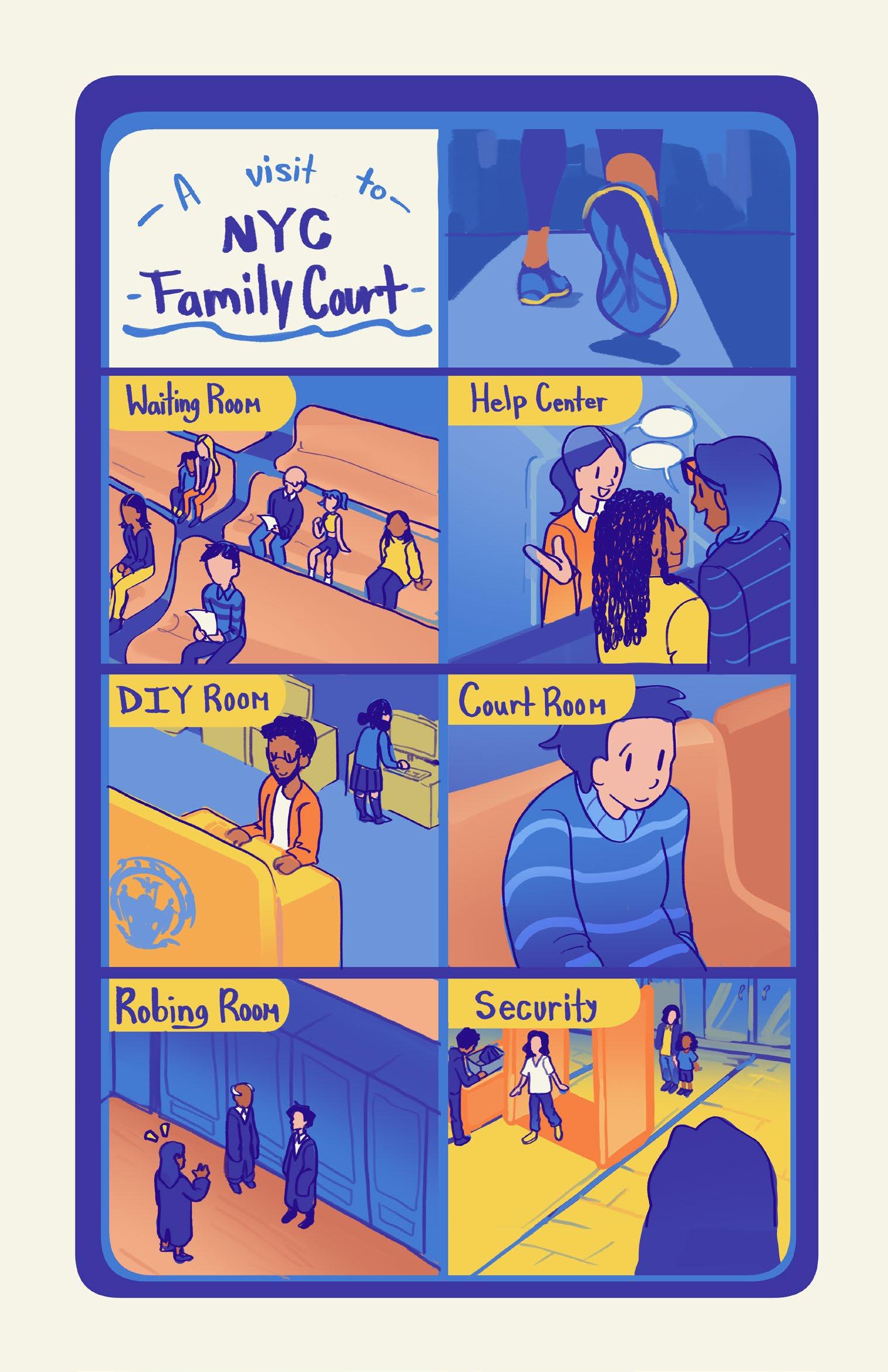

For open cases that involve custody, visitation, family offense (order of protection) or guardianship, you might qualify to be assigned an attorney.
Help Center staff can assist with the filing of certain types of petitions in NYC Family Court.
These Family Court petitions include:
• Family Offense (Order of Protection)
• Visitation and Custody of Children
• Guardianship
• Child or Spousal Support
• Paternity & Parentage
• PINS (Person in Need of Supervision)
• Interstate Support (Uniform Interstate Family Support Act Forms/ “UIFSA”)
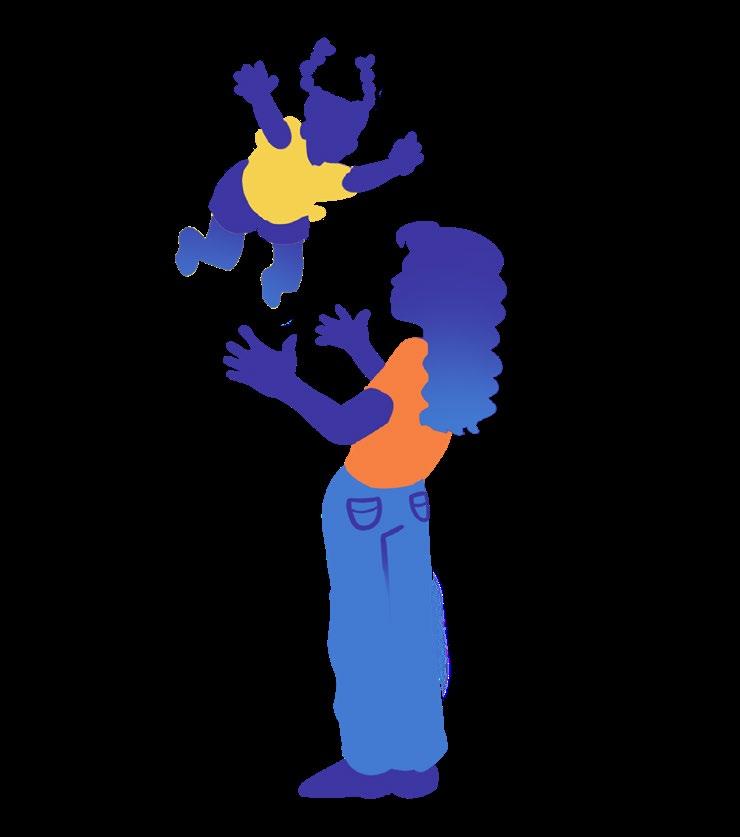

Our Help Center has Do-It Yourself (DIY) digital computer workstations that offer free and easy-to-use programs that help court users file petitions. These programs guide users through multiple questions and use the answers to create and file petitions.
Court users can file DIY petitions for a variety of cases including the following:
• Visitation Modifications
• Paternity
• Child Support
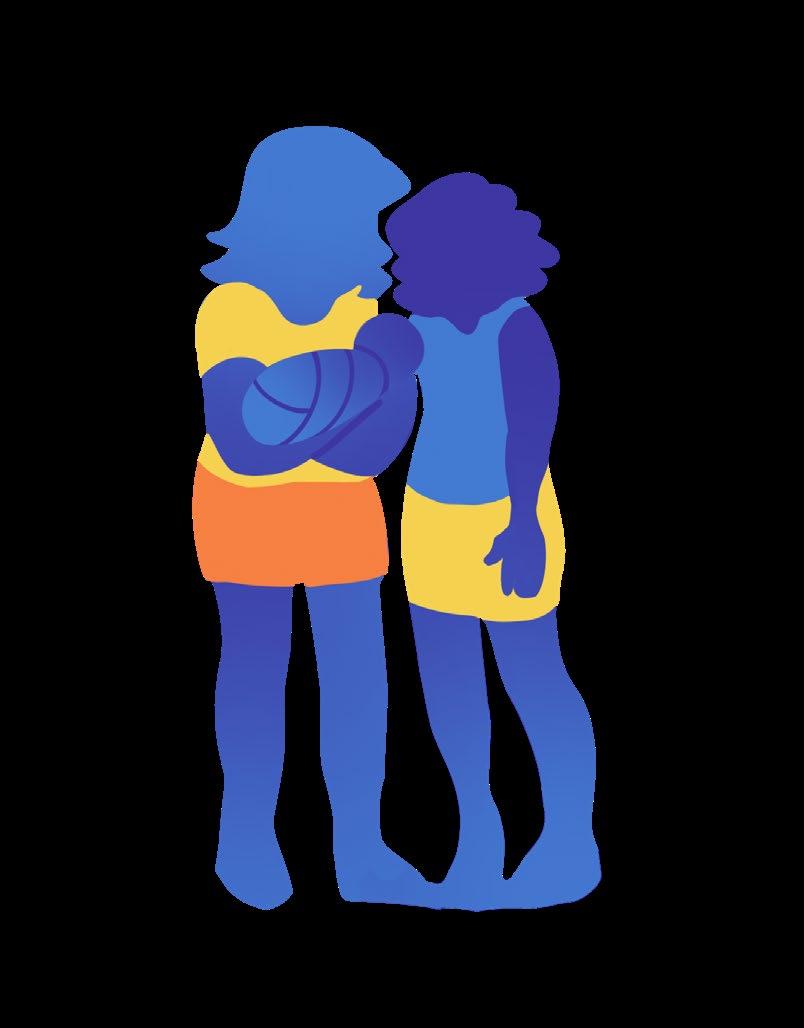
• Support Modifications
• Support violations
Do-it-Yourself (DIY) terminals are available of court users to use a guided program to file Violation Modifications, Paternity, Child Support, Support Modifications, Support Violations. The DIY program guides court users through a series of simple, easy-tounderstand questions to help them complete and generate a petition.
The Help Center can also provide information about other court services, such as:
• Custody Visitation Mediation
• Volunteer Attorney Program (VAP)
• The Children’s Center

We offer the following resources for Self -Represented Litigants:
The New York City Attorney Volunteer Program (VAP) provides the following:
• Free online and phone consultations with a lawyer in Support, Paternity, Custody, Guardianship, Visitation, or Family Offense Cases
• Limited in-person appointments also available
• 45-minute appointments
• Volunteer Lawyers do not represent you in court
• For more information or to schedule an appointment
• Call: 347-401-9460
• Visit the website using the QR code provided

If you have a custody or visitation case, you can ask the court to send your case to mediation. Mediation is free, optional, and private. During mediation, you and the other parent work with a neutral person to agree on a parenting plan. If the judge or referee agrees with the plan, it will become an official court order.
PUBLICNYCMEDIATION@nycourts.gov
If you are being forced or threatened to engage in sex or work against your will, you have the right to get help—regardless of your immigration status.
Call the National Human Trafficking Hotline at 1-888-373-7888 or Text “HELP” to 233733 (BEFREE) Support is confidential and available 24/7 in multiple languages.

1. In-Person: Family Court is open to anyone who wishes to ask questions, receive copy of an order, or file a petition in the Help Center.
• Filing Hours: Family Offense petitions may be filed in person from Monday - Friday (excluding holidays) between 9am and 3pm for sameday appearance before a jurist.
• Late Filing: Petitions filed after 3pm may be calendared for the next operational court date.
• Alternative Filing Options: When occurring after hours or on weekends, petitioners seeking an order of protection may file in Criminal Court.
2. E- Filing via New York State Courts Electronic Filing (NYSCEF): Attorneys and self-represented litigants can use the NYSCEF E-Filing system for the following case types:
2. Custody/Visitation/Guardianship
3. Parentage/Assisted Reproduction/Parentage - Surrogacy
4. Paternity/Support
3. Do-It-Yourself (DIY): Computer terminals are available within all New York City Family Courthouses, where court users can answer guided questions to file petitions.

The Record Room is the office that holds the Family Court records. If you would like to make a request for copies of court documents and orders, please bring a photo ID (like a driver’s license, state identification card, passport, or student ID) verifying your identity to the Record Room. No documents will be released to any person without proper verification.
The Record Room offers other functions, including:
• Transcript Requests
• Appeals
• Subpoenaed Records
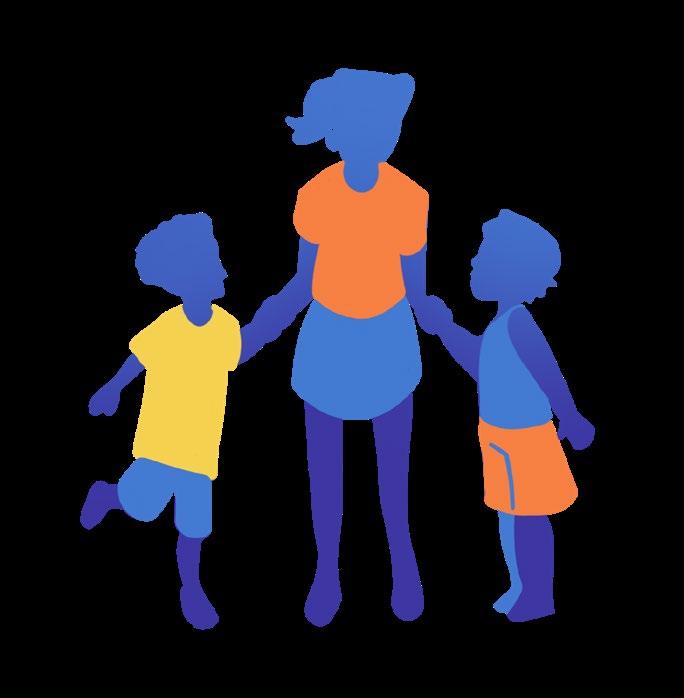
If you are a victim of domestic violence or intimate partner violence, you can inform the Help Center staff. They will connect you with Safe Horizon advocates, who are located onsite. These advocates can assist you with filing an Order of Protection directly from within their offices.
Scan the QR code below to learn about the various career opportunities available in the New York State Unified Court System. Whether you’re beginning your career or seeking advancement, there are jobs in legal services, clerical positions administration, court interpreting, court reporting, and more that fit different skills and interests.
It is the policy of the UCS to ensure equal employment opportunity for all employees and applicants for employment, without regard to race, color, national origin, religion, creed, sex (including freedom from sexual harassment), sexual orientation, age, marital status, disability, or, in certain circumstances, prior criminal record.
Family court plays a vital role in supporting families and protecting children in New York City by addressing legal matters that require court intervention. Working here means you can make a real difference through roles in law, social work, administration and other fields.

You can volunteer for the Court Navigator Program, part of the New York State Unified Court System’s Office for Justice Initiatives, is designed to help individuals who come to Family Court without a lawyer. Court Navigators are trained nonlawyers who assist self-represented litigants by explaining court procedures, helping with forms, and offering general guidance to reduce confusion and stress. The program focuses on making the court process more accessible and understandable for families facing challenging legal issues, such as custody, visitation, guardianship, or child support.
For more information about the Court Navigator Program email courtnavigator@nycourts.gov.
This program offers regional law students a valuable opportunity to gain practical, hands-on experience in one of the most vital areas of the legal system. This tenweek program begins in late May and is designed to expose students to the critical work of New York City Family Court.
Interns collaborate closely with judges, court attorneys, and legal staff on a range of cases involving custody, visitation, child support, domestic violence, child protection, and juvenile delinquency.
Typical responsibilities include conducting legal research, drafting legal memorandum and court documents, observing courtroom proceedings, and assisting with case preparation. The experience provides a meaningful introduction to the inner workings of Family Court and the legal challenges facing children and families in crisis.
For more information about the summer legal internship, please contact the career services office at your law school.


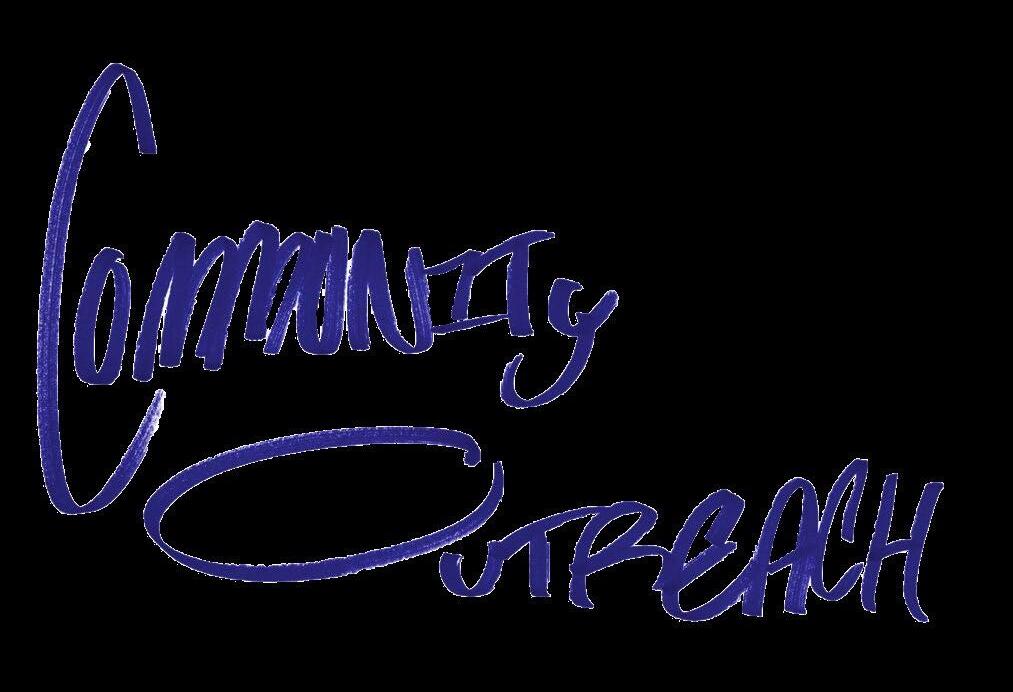
The New York City Family Court’s Community Outreach initiatives reflect a deep commitment to building relationships, fostering trust, and expanding access to justice for all families. The court works with a wide range of community partners, including schools and colleges, faith-based organizations, healthcare and social service providers, legal services and advocacy groups, community organizations, the New York Public Library (NYPL).
Through Family Court tours, students, educators, and the public-at-large are invited into the courthouse to observe proceedings (when appropriate), meet staff, and learn about the court’s role in handling matters such as custody, visitation, child support, and child protection. Whether inside the courthouse or out in the community, these efforts support the court’s broader mission to advance Access to Justice and Equal Justice.


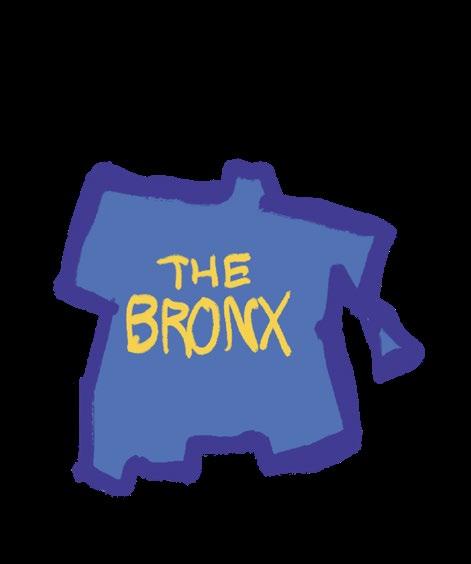

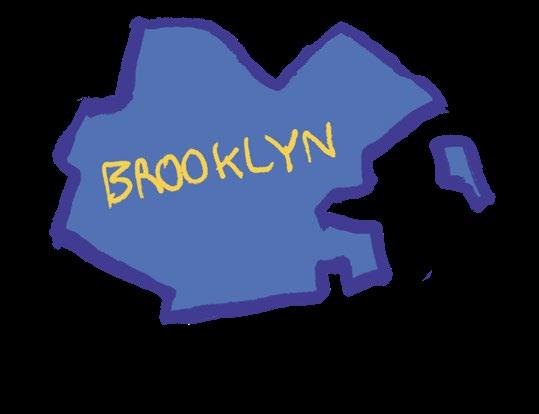

Queens County Family Court is located at: 151-20 Jamaica Ave, Jamaica, NY 11432
Across from Rufus King Park
1st Floor
Phone: 718-298-9600
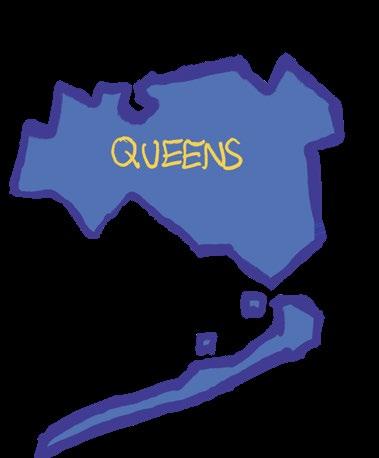
Email: queensfamilycourt@nycourts.gov
Help Center Phone: 718-298-0295
Richmond County Family Court is located at: 18 Richmond Terrace, Staten Island, NY 10301
Across from St. George Terminal
Phone: 718-675-8800
Email: richmondfamilycourt@nycourts.gov
Help Center Phone: 718-675-8860 3rd Floor

CITYWIDE COURT ADMINISTRATION
ADMINISTRATIVE JUDGE: Hon. Anne-Marie Jolly
DEPUTY ADMINISTRATIVE JUDGE: Hon. Peter J. Passidomo
CHIEF CLERK: Eugene W. Hurley
FIRST DEPUTY CHIEF CLERK: Ruth Whalen
BRONX COUNTY FAMILY COURT
SUPERVISING JUDGE: Hon. Alison Hamanjian CLERK OF COURT: Danielle D. Vialet
NYS COURT OFFICER-MAJOR: Henry C. Chen
KINGS COUNTY FAMILY COURT (Brooklyn)
SUPERVISING JUDGE: Hon. Gilbert A. Taylor CLERK OF COURT: Ryan Darshan
NYS COURT OFFICER-MAJOR: Tara Sonnenberg
NEW YORK COUNTY FAMILY COURT
SUPERVISING JUDGE: Hon. Karen I. Lupuloff
CLERK OF COURT: Juan Paez
NYS COURT OFFICER-MAJOR: Jamal Matthews
QUEENS COUNTY FAMILY COURT
SUPERVISING JUDGE: Hon. Alicea Elloras-Ally CLERK OF COURT: Keisha Kearse
NYS COURT OFFICER-MAJOR: Erica Prosper
RICHMOND COUNTY FAMILY COURT (Staten Island)
SUPERVISING JUDGE: Hon. Ben Darvil Jr. CLERK OF COURT: Rafael Dilones
NYS COURT OFFICER-MAJOR: John Bonnano
The NYC Family Court docket number system begins with a letter which tells the type of case filed:

A: Adoption
B: Permanent termination of parental rights
D: Juvenile delinquency
E: Designated Felony
F: Child or spousal support
G: Guardianship
K: Destitute Child
L: Voluntary Foster Care Approval
NN and NA: Neglect / Abuse
O: Family offense (order of protection)
P: Paternity and Parentage
S: PINS (Person in Need of Supervision)
U: Interstate support
V: Visitation and custody of children
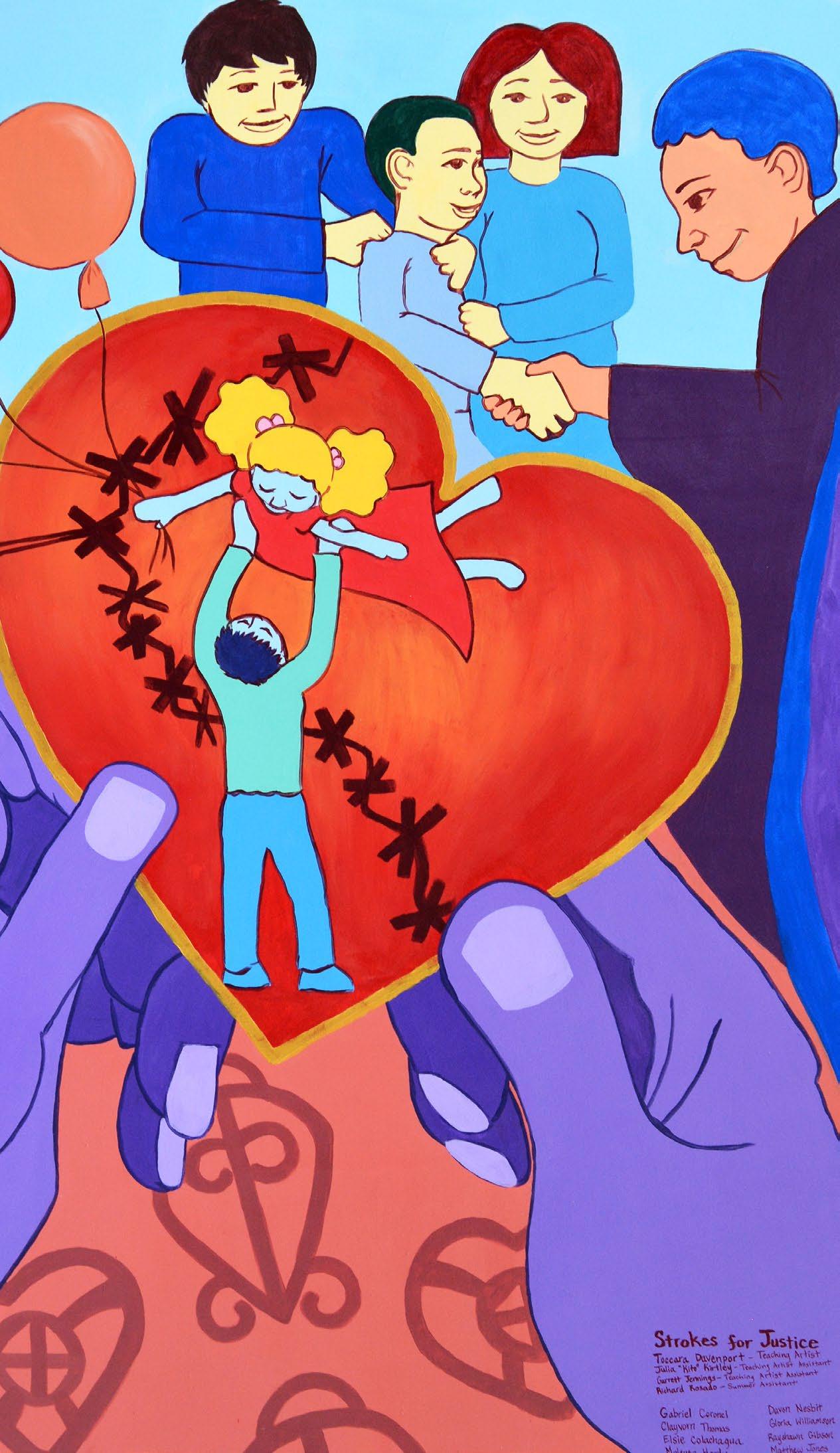

NYS Court employees provide support for courtroom operations in fields such as court security, court interpreting, and court reporting. Employees also assist court operations by issuing court rulings, court orders, notices and forms; supervising, assigning and training staff; processing court documents, filing and exhibits presented in court; operating automated case management recording systems and other technologies, and interacting with the public and court users.
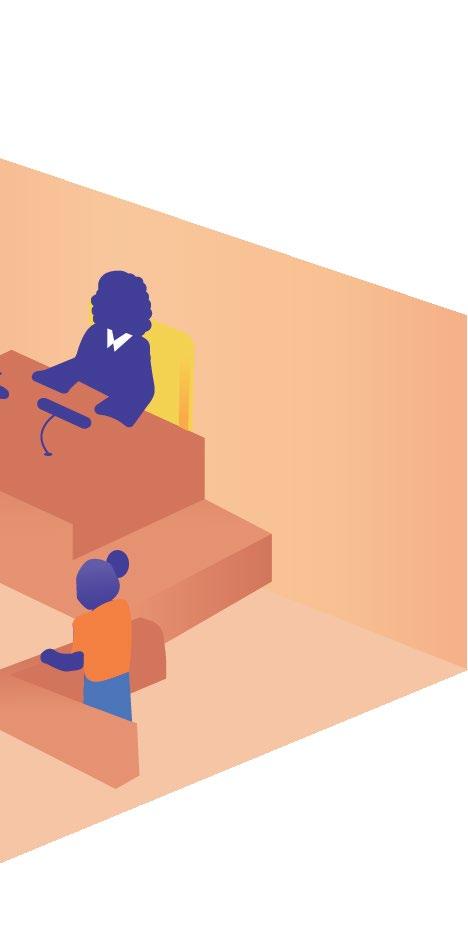
- Respondent
- Respondent’s Attorney
- Petitioner
- Petitioner’s Attorney
- AFC
- Court Interpreter

JUDGE:
A judge is a person who presides over cases and makes decisions in legal cases. Judges hear testimony, consider evidence, and then decide whether the case has been proven/not.
OFFICE CLERICAL SUPPORT:
Office clerical support staff perform a variety of clerical and administrative support tasks, including checking, sorting and filing court papers, carrying out keyboarding functions and other general office work.
PETITIONER:
The petitioner is the person or agency who starts a legal case by filing a petition with the court, asking for a specific legal action or decision against another person (respondent).
PROBATION OFFICER:
Probation officers work for the Department of Probation and provide judges with reports and background information about the individuals involved in court cases.
RESPONDENT:
A respondent is the person who responds to the petition filed in court and is asked to address or defend against the claims made in court by a petitioner.
SPECIAL ASSISTANT CORPORATION COUNSEL/ ADMINISTRATION FOR CHILDREN’S SERVICES:
An attorney from the Administration for Children’s Services who prosecutes child abuse, neglect, and termination of parental rights cases.
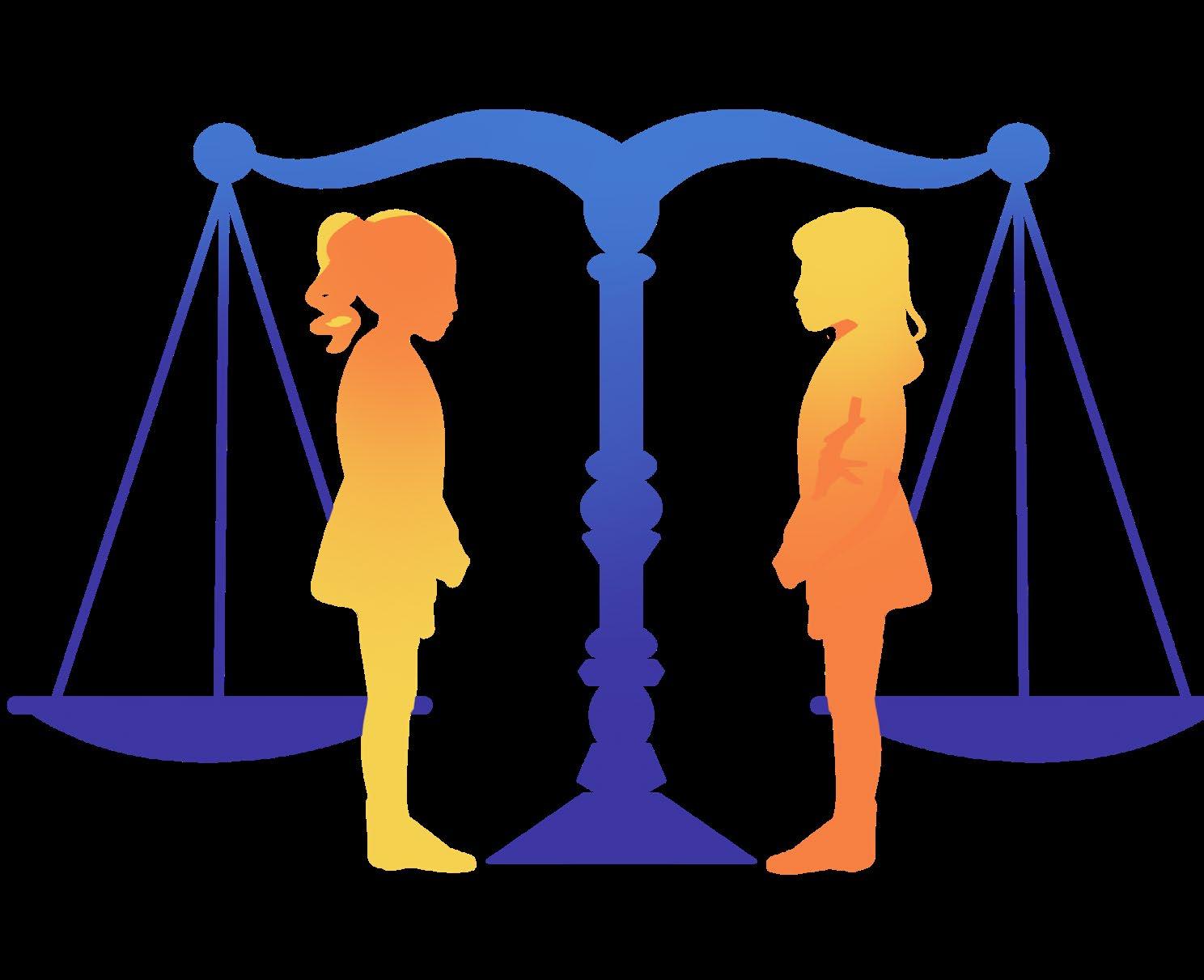
A Support Magistrate presides over cases involving child and spousal support, as well as paternity and parentage matters. These include petitions seeking financial support or asking the court to establish legal parentage.
Certain cases, such as custody, visitation, and orders of protection, may be handled by a court attorney-referee or judicial hearing officer (JHO). Depending on the matter, they may hear and decide the case, issue temporary or final orders, or hear and report to a judge about the case.
Court clerks may be assigned to work in courtrooms or back-office support units where they perform a variety of tasks, including calling the calendar, preparing written correspondence and examining court documents to ensure accuracy.
Court interpreters provide spoken and sign language access by converting the words and concepts expressed in the spoken English language into another language and vice versa in the courtroom and other settings. Spanish interpreters are usually available daily in the courthouse, and interpreters of many other languages, including sign language for the hearingimpaired, may be ordered by the court.
COURT OFFICERS:
Court officers are highly trained law enforcement professionals responsible for the security and protection of judges, court employees, and the public in courthouses and court facilities.
COURT REPORTERS:
Court reporters are responsible for the accurate recording and transcribing of testimony in the courts. Records are kept of all testimony and statements made during court hearings. In many courtrooms, they use a specialized stenographic machine to capture every word in real time, later producing a complete transcript upon request. Hearings before judges/ jurists may also be digitally recorded.
In some Family Court cases, the judge, JHO, referee, or support magistrate may assign a lawyer to represent an adult party who can not afford to hire a lawyer, at no cost.
An attorney from the New York City Law Department, who prosecutes juvenile delinquency cases, and may also represent the petitioner in some support, and paternity cases, if assigned by the judge.
ATTORNEY FOR CHILD (AFC):
The attorney for the child is a lawyer appointed by the court to represent the wishes and interests of a child in a legal case.
CASEWORKER:
Child welfare agency caseworkers are assigned to work with families,provide updates and reports to the Court, and provide testimony during hearings.
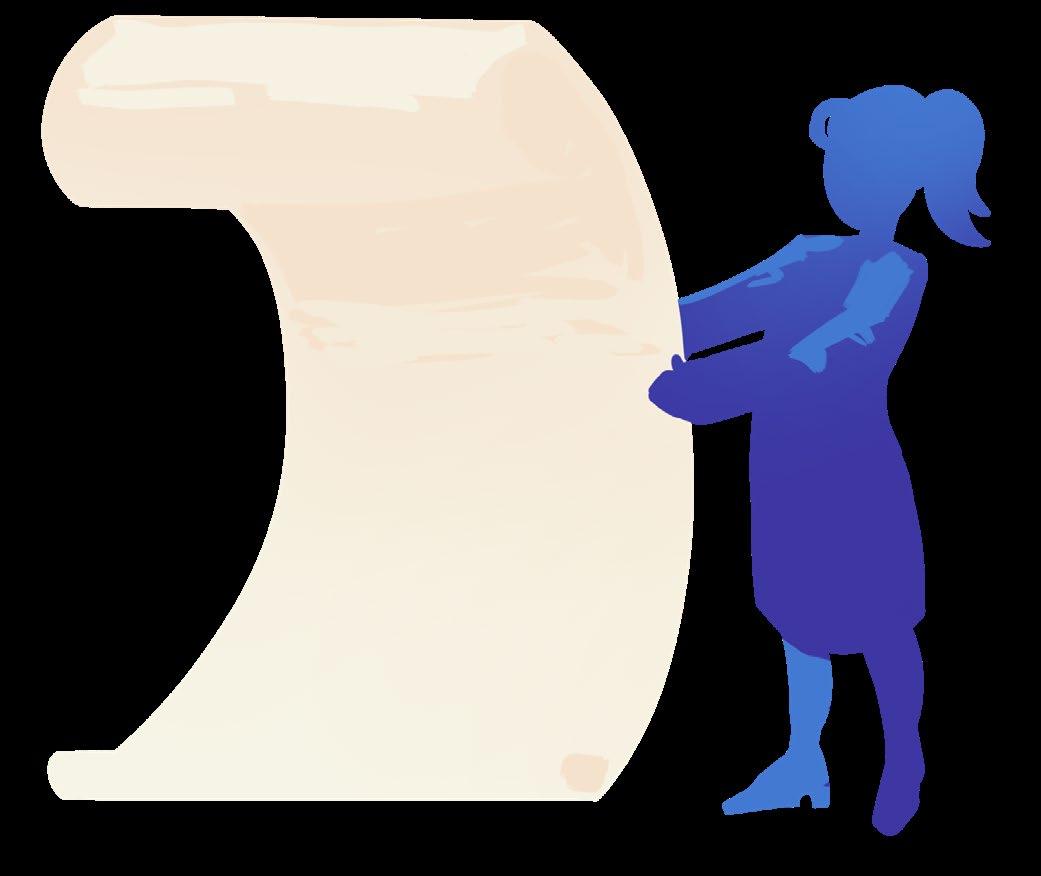
Court assistants help court users file petitions, answer questions in our Help Centers, and serve as clerks in support parts.
A court attorney is a lawyer who works closely with a judge by researching and assisting in writing decisions. Court attorneys may also hold conferences with the attorneys or parties involved in a case to help resolve matters and reach an agreement without the need

Corporation Counsel, Special Counsel, Guardian Ad Litem Caseworker. Members of the media, shall have access to all courtrooms, lobbies, public common areas of Family Court otherwise open to individuals


New York State Child Abuse & Maltreatment Central RegistryA New York State agency responsible for maintaining all reports of alleged child abuse and maltreatment are recorded.
Office of Child Support Enforcement (OCSE) - A division of the Administration of Children’s Services that provides custodians of children assistance in obtaining support, including financial and medical, establishing paternity and support obligations and enforcing such court orders.
Office of Children & Family Services (OCFS) - The New York State agency which administers the institutional placement of minors after juvenile delinquency findings.
Order of Protection (OP) - Order prohibiting a person from harming or threatening another.
Order of Visitation - Order which provides that the person who has custody of a child(ren) must allow the non-custodial parent or another person to visit the child(ren) on specific days and times.
Office of Temporary and Disability Assistance (OTDA) - A New York State agency responsible for overseeing child support initiatives statewide.
Permanency Planning HearingHearing involving a child in foster care, court ordered or voluntary, to establish time frames for the return of the child to his/her home or other
18B Attorney - An attorney assigned by the court to represent a party in the Family Court. The assignment is made under County Law Sec. 18b.
Administration for Children’s Services (ACS) - A New York City agency charged with investigating allegations of child abuse/neglect, encouraging family stability and when necessary, the placing of children in foster care and/or adoption.
Alternative Dispute Resolution (ADR) - Ways to resolve disputes without a trial. Typical ADR processes include mediation, arbitration, neutral evaluation, and collaborative law. These processes are generally confidential, less formal, and less stressful than traditional court proceedings.
Center for Family Representation
- Attorneys and certified social workers who represent and provide services to parents in certain Family Court cases.
Children’s Law Center - Attorneys and certified social workers who represent and provide services to children in Custody/Visitation cases.
Family Treatment Court (FTC)A special program designed to help respondents and their children get back together and stay together. This program is designed to service individuals who have a neglect case against them with alcohol or substance abuse allegations.
Guardian Ad Litem (GAL) - Acts as a neutral representative and is appointed to a case when a parent or party to the case is mentally ill, cognitively impaired, developmentally disabled, or otherwise unable to understand or participate in court proceedings.
Kinship Foster Care - Foster care placement with a family member.
Legal Aid Society (LAS) - A New York City Agency that provides legal representation as Attorneys for Child to children in certain Family Court cases.
Legal Aid Society Juvenile Rights Practice (LAS/JRP) - An office of the Legal Aid Society which provides legal representation (Attorney for Child) to children in Family Court cases.
Lawyers for Children (LFC)Attorneys and certified social workers, who provide services to children as Attorneys for Child in foster care review and termination of paternal rights proceedings.
This document provides a comprehensive reference of common acronyms used in Family Court proceedings. Understanding these terms is essential for navigating the legal system effectively, whether you’re a parent, guardian, legal professional, or advocate working within the family court system.
Court Proceedings and Administrative Terms
ACD: Adjournment In Contemplation of Dismissal: Temporary adjournment with view to ultimate dismissal in furtherance of justice.
ADJ: Adjournment: Temporary postponement of proceedings until a specified future date.
FF: Fact-Finding Hearing: Court hearing where charges are proven or disproven.
Other important terms include “De Novo” (new trial from beginning), “Ex Parte” (application made without notice to other parties), and “In Camera” (proceedings held in judge’s chambers without public presence).
Agency and Personnel Acronyms
Child Protection Agencies
ACS: Administration for Children’s Services: City agency investigating child abuse/neglect
CASA: Court Appointed Special Advocates: Non- attorneys aiding children in foster care
CLC: Children’s Law Center
FCLS: Family Court Legal Services: ACS office providing legal services
Legal Representatives
18B: Attorney assigned by court under County Law Sec.
ACC: Assistant Corporation Counsel
AFC: Attorney for the Child: Person appointed by the court to represent a minor in certain Family Court cases.
GAL: Guardian Ad Litem: Courtappointed representative for minor
Orders and Legal Documents:
Petition (Pet): Verified written request to commence proceedings for specific relief. Filed by the Petitioner.
Court Orders:
• OP (Order of Protection)
• OS (Order of Support)
• OTSC (Order to Show Cause)
• OF (Order of Filiation)
• DWP (Dismissal With Prejudice)
• DWOP (Dismissal Without Prejudice)
• Dispo (Disposition)
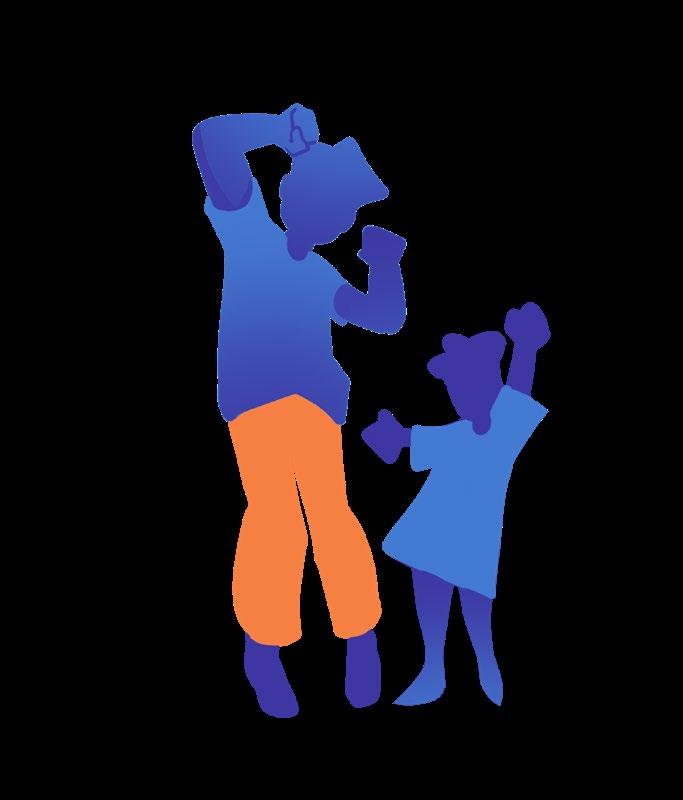

This brochure was created for the New York City Family Court as part of the Creative Art Works’ (CAW) Public Art Youth Employment program, which gives paid apprenticeships to NYC teens and young adults creating large-scale public art and multimedia projects. Since 2011, CAW has implemented dozens of such projects in partnership with the NYC Family Courthouses, yielding more than 30 individual works of art for the enjoyment of families and court personnel. This guidebook was created with the support of the NYS Unified Court System’s Office for Justice Initiatives.
